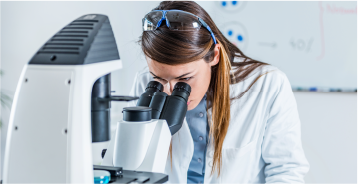Epigenetics and addiction – why quitting is more than just sheer willpower
 Health and Wellness
Health and Wellness
We need to process your personal information for you to interact with this website. We also use Cookies to enhance your experience. Please accept the Website Ts and Cs and Data Protection and Privacy Policy to fully access the website.
Your gut is your gastrointestinal system, which includes your stomach, intestines and colon. Your gut microbiome, which is full of micro bacteria, not only helps to regulate digestion, manage inflammation and boost your immunity, but can have a profound influence on your mood, cognition and overall mental wellbeing. The intricate connection between your gut and brain can be disrupted if you have an unhealthy gut.
The unhealthy gut
Several symptoms can point to an unhealthy gut, including bloating, constipation, diarrhoea and abdominal pain. Most fascinatingly, beyond the physical symptoms and discomfort, research increasingly shows that an imbalanced gut microbiome can contribute to mood disorders like anxiety and depression.
A 2023 study focusing on the relationship between gut microbiomes and anxiety and depression, and how to manage it, stated that “patients with inflammatory disorders are more likely to experience depression. Episodes of depressive symptoms are expected with severe inflammatory bowel disease conditions, possibly related to disrupting the pathways involved in the gut-brain axis.”
The study also noted that persistent neuroinflammation can alter brain functioning and can affect a person’s mood and behaviour.
Supporting your own gut health
So, how can you support your gut health and subsequently nurture a positive gut-brain connection?
One of the most fundamental aspects is your diet. The adage ‘eat the rainbow’ holds true, as you need a range of fibre-rich fruits, vegetables and whole grains as part of your diet. Your gut absorbs nutrients from food, such as vitamins B6 and C, as well as omega-3 fatty acids. Vitamin B6, found in lean animal proteins, nuts and seeds, helps to boost your energy levels. It also supports the production of serotonin (the happy hormone) and dopamine (the pleasure / reward hormone). Serotonin also assists with gut motility. When you’re stressed, your gut produces less serotonin, so you may experience bloating, indigestion or constipation as a result.
Vitamin C, found in fresh fruits and vegetables, supports your immune system and aids in the production of noradrenaline in the gut, which is a hormone that helps you to focus.
Your brain is 60% fat, so it needs good fats to function optimally. Your gut absorbs omega-3 fatty acids (found in certain fish, seeds and nuts), which help to maintain good brain function. Omega-3 fatty acids also help to reduce inflammation. If there is an imbalance in your gut microbiome, it could lead to chronic inflammation, which presents as bloating or constipation. High inflammatory markers in your gut, or even across your body, can negatively influence brain function and contribute to mood disorders, which, in turn, increase gut problems.
Prebiotics and probiotics help to maintain a healthy gut microbiome. Prebiotics are fibres which feed good gut bacteria and help with gut motility. They’re found in fresh fruits and vegetables, nuts and seeds, and herbs and spices.
Probiotics are good bacteria. They help to produce a neurotransmitter called GABA (gamma-aminobutyric acid), which influences mood, cognition, sleep and anxiety regulation. Probiotics are found in some fermented foods (yoghurt, mature cheeses, kefir and maas) and food pickled in brine (olives, onions and gherkins). Probiotic supplements can also make a big difference, so discuss these with your doctor if you are experiencing gastrointestinal issues.
Polyphenols are antioxidants that help to protect your gut. They’re found in bitter-tasting food (dark chocolate, herbal teas, coffee, berries, herbs and spices), nuts, seeds, vegetables and whole grains (oats, barley, brown rice, sorghum / mabele).
It’s recommended to eat a wide variety of fresh and unprocessed foods for your gut to absorb different nutrients. Also, stay hydrated to ensure regular bowel movements, digestion and nutrient absorption in your gut. Limit processed foods, and foods high in sugar content and artificial colourants, which can negatively impact your gut microbiota.
Regular exercise can also improve your gut health. According to the Alabama Colon and Rectal Institute, diet, sleeping habits and exercise are the three most vital factors, contributing to your digestive health. Some benefits of exercise for digestion include:
Managing stress is equally important. The 2019 study that examined the link between stress, depression, diet and the gut microbiota states that “…stress and depression can reshape the gut bacteria’s composition through stress hormones, inflammation, and autonomic alterations. In turn, the gut bacteria release metabolites, toxins, and neurohormones that can alter eating behavior [sic] and mood.” Effective ways to manage stress are hobbies, aromatherapy (lavender or lemon balm essential oils) and exercise.
The essence of gut health
The primary factor in gut health is proactive care. A healthy diet, exercise and stress management are all key. Fortunately, if you have a chronic gut condition, there are ways to improve your gut health, and nurture a strong and healthy gut-brain connection.
Remember to seek professional help if you experience mental health and gut disorders. Speak to your general practitioner (GP), who may refer you to a psychologist to help manage stress, depression and/or anxiety.
Bestmed’s Tempo wellness programme offers our members hands-on support with regards to nutritional, physical and emotional wellbeing. The holistic approach to wellness will certainly also improve your gut health. Your gut lays the foundation for a happier, healthier you. Give it everything it needs to thrive.
Tempo Wellness Webinar
For more information, a Tempo Wellness Webinar on how your gut health affects your mental health is available for you to view via YouTube here.
Resources: